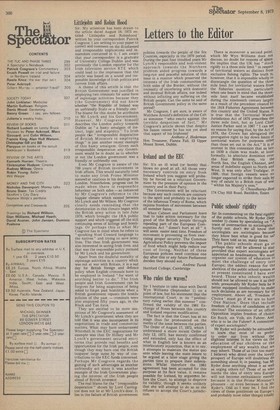Who rules the waves?
Sir: I hesitate to take issue with David Wyn Williams (September I) on a point of law, but his statement that the International Court, in its "preliminary ruling earlier this summer" confirmed the validity of the 1961 Exchange of Notes between this country and Iceland requires modification. The fact is that the Court has at no stage thus far pronounced on the merits of the issue between the parties. The Order of August 17, 1972, which I understand a more recent Order of July 12, 1973, has merely confirmed and extended, only has the effect of what in English law is known as an interlocutory injunction, that is to say, it attempts to maintain the status quo ante while leaving the main issues to be argued at a later stage giving the parties time to prepare their submissions. Whilst therefore the 1961 agreement has been accepted for this purpose at its face value, it remains possible for Iceland, by argument before the Court, to attempt to disprove its validity, though it seems unlikely that she will attempt to do so as she refuses to accept the Court's jurisdiction. There is moreover a second point, which Mr Wyn Williams does not discuss, no doubt for reasons of space. He implies that the UK has "stuck rigidly to a three mile limit" in respect of territorial waters as distinct from exclusive fishing rights. The truth is, however, that it is impossible wholly to disentangle the question of the three mile limit for territorial waters from the fisheries question, particularly when one bears in mind that the threemile limit itself became established during the nineteenth century largely as a result of the precedent created by the 1818 Fisheries Agreement between this country and the United States. It is true that the Territorial Waters Jurisdiction Act of 1878 prescribes the three mile limit, but as Lord Chief Justice Parker said in 1967 "I can see no reason for saying that, by the Act of 1878, the Crown has abrogated the prerogative right to lay down limits of territorial waters for purposes other than those set out in the Act." It is of interest in this connexion that as late as 1830 a claim was made, at least formally, to absolute dominion over the four British seas, viz the North Sea, the English Channel, and areas of indefinite eistent to North and West. It was only after Trafalgar. in 1808, that foreign vessels were no longer expected to strike their sails by way of salute to a Britsh man of war "within his Majesty's seas."
C. Chowdharay-Best 174 Clay Hill Road, Basildon, Essex


































 Previous page
Previous page